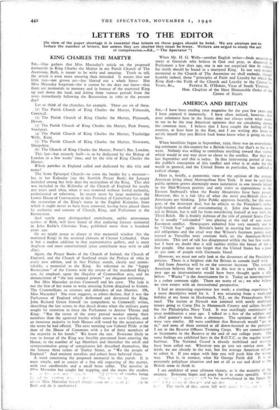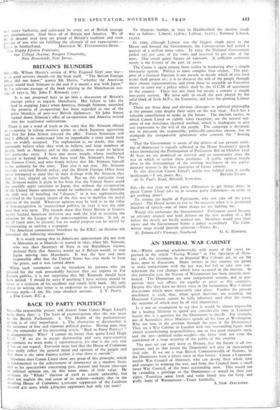AMERICA AND BRITAIN
S1R,—I have been reading your magazine for the past few years and I have enjoyed it immensely. I have often noticed, however, that your columnist here in the States does not always write what seems to me to be the true American opinions that are circulating among the common men. I believe that I have caught the feeling of the country, at least here in the East, and I am writing this letter to satisfy myself that you British back home know what is going on over- here. When hostilities began in September, 1939, there was an overwhelm- ing sentiment in this country for a British victory, but that's as far as it went. Nobody was willing to contribute anything toward that victory which would in any way draw us closer to the conflict. But that was last September and this is today. In that intervening period of time the public's conception of this conflict and what is at stake for the world in general, and the United States in particular, has suffered a radical change.
Here is, briefly, a panoramic view of the opinion of the average American living about Metropolitan New York. It may be said that public opinion grows alarmingly more isolationist as one travels inland to the Mid-Western prairies and only starts to approximate to the Eastern Seaboard's when the Rocky Mountains have been passed. However, this is a fair idea of what the most pro-British class of Americans are thinking. John Public approves heartily, for the most part, of the destroyer deal, but he objects to the President's rather high-handed method of consummating it. John also favours more aid to Britain, but is still far from considering himself at war with the Third Reich. He is frankly dubious of the role of general Santa Claus he is usually " rail-roaded " into playing at the end of any major European conflict. Newspapers exhorted him very recently not to be " Uncle Sap " again. Britain's laxity in meeting her twenty-year- old obligations and the cruel way that Wilson's fourteen points were treated at Versailles were constant boils on the American-British relations. This sort of talk has disappeared within the last few weeks, but I have no doubt that it still rankles within the breast of not a few people. One must not forget that the United States has a good 3o per cent. of people with Germanic blood.
However, we must not only look at the dissenters of the President's policies. There is a brighter side for Britain to console itself with.
Aid from America will be on the constant increase. The average American believes that we will be in this war in a year's time. A year ago an interventionist would have been thought quite a silly fellow. " Wacky " is the Americanese for it. Today an interventionist is a rather common sight. There are many of us ; we who believe
we view events with an international perspective. •
I had an interesting experience last week; a startling experience a more descriptive word for it. I was returning from a week-end holiday at my home in Hackensack, N.J., on the Pennsylvania Rail- road. The station at Newark was jammed with newly mobilised troops going to Camp Dix in Monmouth County and sailors headed for the Philadelphia Navy Yard. It was startlingly reminiscent of your mobilisation a year ago. I talked to a few of the soldiers and a chief gunner's mate from a destroyer. The opinions of them all were very similar. All were confident that Roosevelt would " get US in," and none of them seemed at all down-hearted at the prospect. I am in the Reserve Officers Training Corps. We are commissioned as lieutenants in the Reserve at the end of our college years. The same feelings are exhibited here in the R.O.T.C. as the regular troops harbour. The National Guard is already mobilised and reserves have been called out. Wherever you go you see service men. In truth, we are already in the war, but the average American refuses to admit it. If you argue with him you will push him the wrong way. That is, in essence, what Sir George Paish did. It is an extremely polyphase situation and not at all as cut and dried as the British seem to think it.
I am confident of your ultimate victory, as is the majority of the country. Everyone hopes and prays for it to come speedily. ‘X'hat far ourchadowed in the future by -ti e trron of thoz.g.,•. and act that . . - --,ir
The seeds of this union fall with ever:. are
with every barbarity, and cultivated by every act of British courage and determination. God bless all of Britain and America. We of Bri:ish descent over here are proud of Britain's tradition and even prouder of you who are fulfilling the ultimate of our expectations.—
192 College Avenue, Rutgers University, New Brunswick, New Jersey.







































 Previous page
Previous page